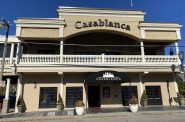Concert Culminates With Musical Earthquake
The Fine Arts Quartet's performance, of an adaptation of the Seven Last Words of Christ, earns a standing ovation.
The Fine Arts Quartet – in residence at the University of Wisconsin-Milwaukee – opened their first concert of the season Sunday afternoon, September 21, at UWM’s Zelazo Center. The Quartet offered a single work – a recent adaptation by José Peris Lacasa of Joseph Haydn’s Seven Last Words of Christ for quartet and soprano. Soprano Ruth Rosique of Spain joined the Quartet.
Violist Juan-Miguel Hernandez has officially joined the Quartet after two seasons as guest artist. He joins long-term violinists Raph Evans and Efim Boico and more recent member, cellist Robert Cohen. The announcement was well received by the audience of several hundred who have been impressed by Hernandez’s bold style.
Haydn’s Seven Last Words of Christ was commissioned to be performed at a Good Friday service in Cadiz, Spain. The seven words are actually phrases selected for liturgical purposes from the four gospels. They represent a complex set of events and emotions on the day of the crucifixion. The words attributed to Christ at the crucifixion cover a range of sentiments including “Father, forgive them” to “Father, why have you forsaken me?” to “I thirst” and ending with “Into your hands, I commend my spirit.” The reflection on the events of the crucifixion ends with a musical earthquake. Adapted by Haydn and others for large ensemble, chorus, solo piano and quartet, the performance usually separates spoken text from musical interludes. Lacasa’s adaptation blends singing of the phrases with the instrumental sections.
The work began with a introduction by the Quartet that sets the stage for the eight reflective sonatas. Each sonata is a slow movement – with subtle but critical differences. Each sonata carefully explores two themes: One, a motif that pulses at different rates for each section drives the work forward. The other, a short melodic phrase, matches the the syllables in the Latin text for each of the seven phrases.
Breaking the silence after the introductory sonata, Rosique began the first words – “Father, forgive them, for they know not what they do.” The opening a cappella “Pa-ter” filled the auditorium with pitch-perfect notes in the upper register, disturbing the silence and signaling the treat in store from the guest soprano. Widely regarded as an opera singer, Rosique did not assume an operatic voice.
The quartet played as an ensemble of equals occasionally in unison. At times, first violin Evans led with the melodic phrase. But Lacasa adapted this quartet version of Seven Words by transferring some of the first violin role to the soprano. Rosique, seated with the Quartet, most often joined the strings as a fifth ensemble member with matching dynamics, only occasionally rising above the strings to fill the hall.
The length of the phrases and their meaning shaped the sections, but without the overtly theatrical treatment of more contemporary composers such as James MacMillan’s cantata version performed by the Bel Canto last year.
“Today you will be with me in Paradise” featured broader harmonies in a more meditative mood. “My God, why hast thou forsaken me?” featured a stronger unison statement and more somber interpretation.
“I thirst” featured brief falling intervals and more intense expression from voice and strings. As Rosique explored the interval motif, the strings often supported the voice with a light pizzicato treatment.
The final phrase, “Father, into thy hands, Lord, I commend my spirit” opened with a melodic hymn-like line. Rosique sang primarily in the middle range until dropping confidently into a low mezzo voice. The pulsing motif was more rapid than usual. Voice and first violin sang the melody line together before the Quartet ended gently with plucked strings.
Rosique sang the upper register lines with a natural ease, but was equally at home with phrases that called for a mezzo voice several octaves lower. Composer Lasca’s approach – creating a vocal line for the words, largely incorporated within the sonata settings – was a very satisfying approach. Guest artist and Quartet earned a standing ovation from the audience.
The Fine Arts Quartet will return to the Zelazo Center November 9th for a concert that will feature quartets by Joseph Haydn and Philip Glass and a work commissioned by the Quartet in 2002 by Russian composer Efim Podgaits, “Quintet for String Quartet and bayan accordion.” For ticket information see the UWM Peck School website or call (414) 229-4308.
Additional preview information may be found at the Friends of the Fine Arts Quartet website.
Review
-
Eating Burmese in Bay View
 Dec 13th, 2025 by Cari Taylor-Carlson
Dec 13th, 2025 by Cari Taylor-Carlson
-
Casablanca Is a Milwaukee Success
 Nov 30th, 2025 by Cari Taylor-Carlson
Nov 30th, 2025 by Cari Taylor-Carlson
-
Oh, Those Witty 18th Century Brits
 Nov 24th, 2025 by Dominique Paul Noth
Nov 24th, 2025 by Dominique Paul Noth





















Standing ovation? Every concert I’ve been to in the last 15 years in Milwaukee has evoked a standing ovation. For audiences in this city, it has lost its meaning.